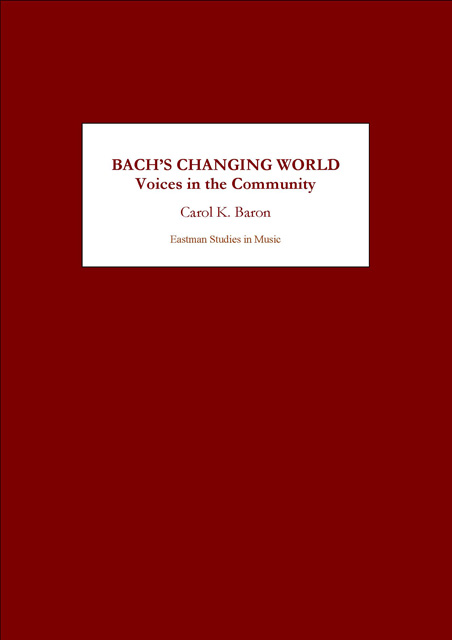Book contents
- Frontmatter
- Dedication
- Map
- Contents
- List of Illustrations
- Editor's Acknowledgments
- 1 Transitions, Transformations, Reversals: Rethinking Bach's World
- 2 Tumultuous Philosophers, Pious Rebels, Revolutionary Teachers, Pedantic Clerics, Vengeful Bureaucrats, Threatened Tyrants, Worldly Mystics: The Religious World Bach Inherited
- 3 Family Values and Dysfunctional Families: Home Life in the Moral Weeklies and Comedies of Bach's Leipzig
- 4 Bach in the Midst of Religious Transition
- 5 Bach's Situation in the Cultural Politics of Contemporary Leipzig
- 6 The Reception of the Cantata during Leipzig Church Services, 1700–1750
- 7 From Salon to Kaffeekranz: Gender Wars and the Coffee Cantata in Bach's Leipzig
- 8 A Treatise on Liturgical Text Settings (1710)
- 9 Random Thoughts About Church Music in Our Day (1721)
- Notes on the Contributors
- Index
- Eastman Studies in Music
2 - Tumultuous Philosophers, Pious Rebels, Revolutionary Teachers, Pedantic Clerics, Vengeful Bureaucrats, Threatened Tyrants, Worldly Mystics: The Religious World Bach Inherited
Published online by Cambridge University Press: 17 March 2023
- Frontmatter
- Dedication
- Map
- Contents
- List of Illustrations
- Editor's Acknowledgments
- 1 Transitions, Transformations, Reversals: Rethinking Bach's World
- 2 Tumultuous Philosophers, Pious Rebels, Revolutionary Teachers, Pedantic Clerics, Vengeful Bureaucrats, Threatened Tyrants, Worldly Mystics: The Religious World Bach Inherited
- 3 Family Values and Dysfunctional Families: Home Life in the Moral Weeklies and Comedies of Bach's Leipzig
- 4 Bach in the Midst of Religious Transition
- 5 Bach's Situation in the Cultural Politics of Contemporary Leipzig
- 6 The Reception of the Cantata during Leipzig Church Services, 1700–1750
- 7 From Salon to Kaffeekranz: Gender Wars and the Coffee Cantata in Bach's Leipzig
- 8 A Treatise on Liturgical Text Settings (1710)
- 9 Random Thoughts About Church Music in Our Day (1721)
- Notes on the Contributors
- Index
- Eastman Studies in Music
Summary
The religious world Bach inherited was as complex and diverse as our own. During the early period of the Enlightenment, which overlapped with Bach’s lifetime, more complex frames of reference subjected religious ideas—beyond those that separated Lutheran orthodoxy, Calvinism, and Catholicism, the three officially recognized religions in the German territories after the Peace of Westphalia (1648)—to question and examination. Among the educated populations, scientific inquiry, mathematical logic, metaphysics, a variety of splinter religions, philosophy, orthodox dogma, and less defined goals of spiritual renewal competed for attention. Some of the empirical claimants to ontological truth were themselves infused with mystical currents that emanated from scientific as well as religious circles, as was even Lutheran orthodoxy (which was devoted to the ongoing process of defining, interpreting, and disseminating Luther's teaching), despite the fact that orthodox dogma resisted the slightest deviations for fear of heresy. In the wake of the devastation caused by the religious fanaticism of the Thirty Years’ War (1618–48), Germans eagerly sought new ways to envision a future in positive religious terms. The religious focus of the Aufklärung absorbed the best minds: theologians of every persuasion, scientists, mathematicians, mystics, philosophers, political scientists, propagandists, and the educated lay public. Often overlapping, their inquiries probed the rational, the spiritual, the revealed, the mystical, even the skeptical, as well as the realm of magic and the occult.
The distinctive urgency of the religious aspect of the Enlightenment in the German states has been attributed to the revolutionary birth of Protestantism in Germany, where religious developments continued to be expressions of “inner renewal.” Perhaps, also, Germans needed this ongoing religious focus as they attempted to understand the destruction and brutality they had suffered during the Thirty Years’ War in the name of religious “truth”—experiences of horror and cruelty still vivid in collective memory. The Saxon philosopher-mathematician Gottfried Wilhelm Leibniz (1646–1716) addressed the problem of belief in an omniscient and loving God when faced with the unfair situations life presents— the dilemma of Job—and developed a complex theodicy.
- Type
- Chapter
- Information
- Bach's Changing WorldVoices in the Community, pp. 35 - 85Publisher: Boydell & BrewerPrint publication year: 2006



